U.S. average prices for both diesel and gasoline continued climbing for the ninth straight week, according to data tracked by the Energy Information Administration (EIA), though both fuels notched their lowest weekly increase over the last three months.
Diesel went up 0.005 cents this week to reach a national average of $4.132 per gallon, which is 27 cents higher per gallon than during the same week in 2011, the agency noted.
Diesel actually declined in three out of the 10 “PADD” or “Petroleum Administration for Defense Districts” used by the EIA to monitor pump prices across the country, falling the most in California, which registered 1.6 cent per gallon drop, followed by the Lower Atlantic (0.002 cents) and Gulf Coast (0.001 cent) regions.
Gasoline price increases also entered the slow lane, with the U.S. average price rising just 0.004 cents to $3.847 per gallon, according to the EIA. However, that’s 18.6 cents higher per gallon compared to the same week in 2011, the agency added.
The slowdown in fuel price increases is also abetted by the quick recovery from Hurricane Isaac by the U.S. petroleum industry, EIA noted.
Its data showed that U.S. crude oil production fell by 772,000 barrels per day (bbl/d) compared with the week before the hurricane made landfall, forcing the shutdown of most of the production in the Gulf of Mexico. Additionally, petroleum imports into the Gulf Coast also dropped considerably by some 1.4 million bbl/d.
However, partly offsetting the drop in crude oil production and imports was a noticeable drop in refinery crude oil inputs of some 678,000 bbl/d, EIA said. However, the drop in refinery inputs was much less than the drop in production and imports of crude oil, so many companies tapped crude oil inventories to make up for the loss in supply, causing U.S. crude oil inventories to fall by 7.4 million barrels.
Yet the EIA still expects fuel prices to start falling, especially as gasoline consumption remains on the decline in the U.S. The agency said its current data indicates gasoline consumption fell 0.3% in the first half of 2012 compared to the same period in 2011 period, with year-over-year economic growth that would generally lead to increased gasoline consumption more than offset by increases in retail gasoline prices and higher fuel efficiency of the in-use vehicle fleet.
Prior to February 2012, the U.S. had consumed less gasoline year-over-year for 13 out of 15 months since November 2010, with the nation’s gasoline consumption decreasing on average almost 240,000 bbl/d in 2011 – a 2.7% reduction from levels in 2010.
Consumption continued to weaken, but at a slowing rate, into the first quarter of this year, declining by about 110,000 bbl/d or some 1.3% compared to the first quarter of 2011 – though EIA pointed out that almost 20,000 bbl/d more gasoline was consumed in February this year that the same month last year, the first year-over-year increase in 11 months.
Also, while gasoline consumption through June was slightly lower year-over-year, consumption in the second quarter increased by almost 60,000 bbl/d compared with 2011.
Still, the agency expects year-over-year gasoline consumption to remain flat by the end of 2012 as an estimated 1.1% increase in overall light vehicle fuel efficiency coupled with moribund economic growth should lead to an overall decline in vehicle travel, thus reducing fuel purchases.
About the Author
Sean Kilcarr
Editor in Chief
Sean Kilcarr is a former longtime FleetOwner senior editor who wrote for the publication from 2000 to 2018. He served as editor-in-chief from 2017 to 2018.
